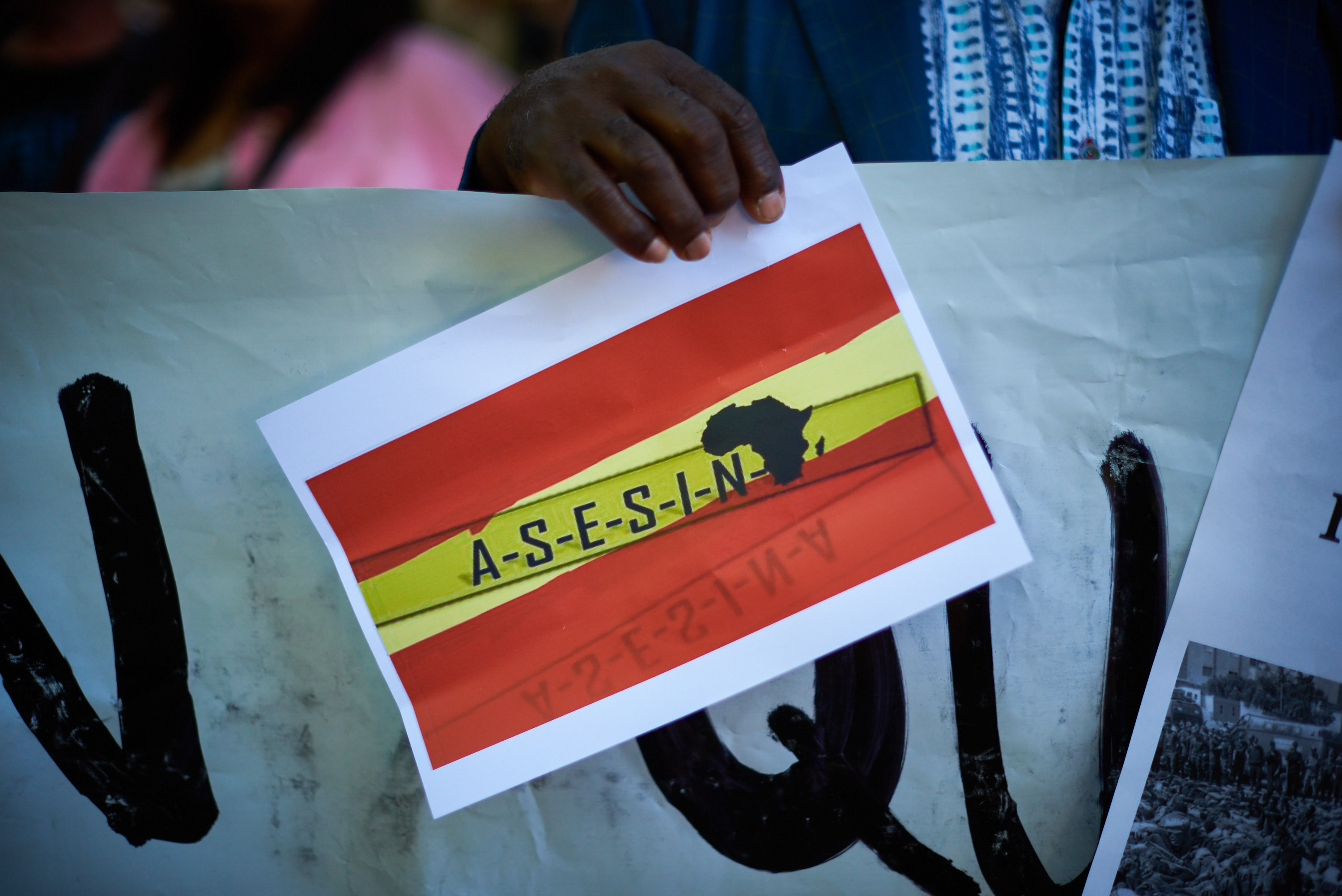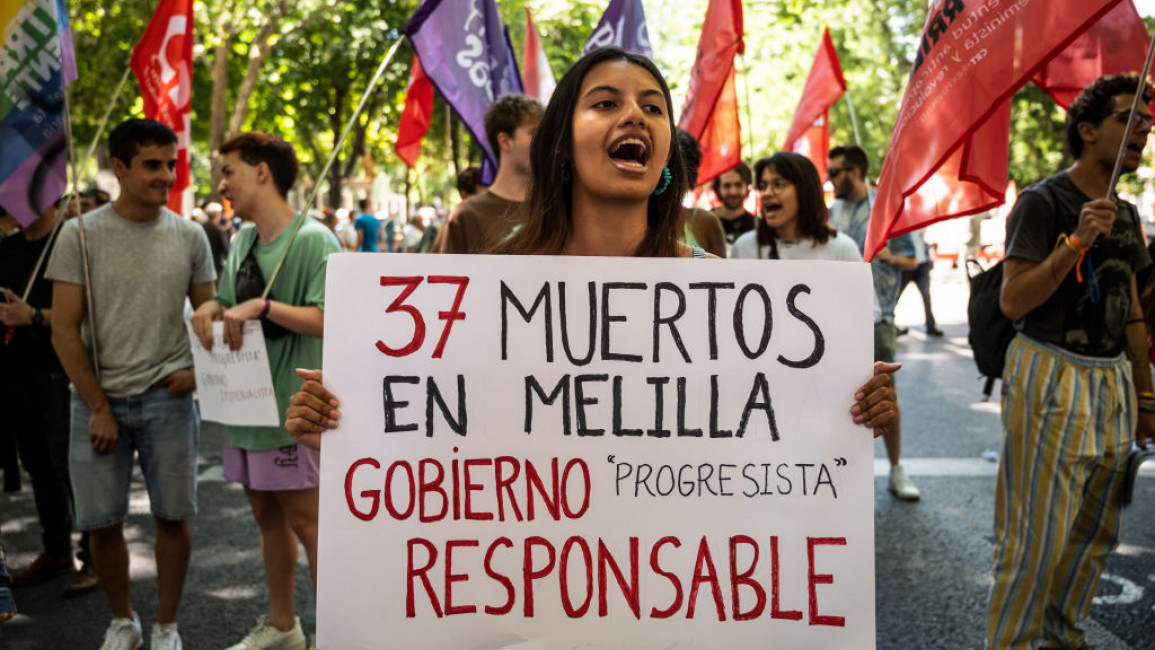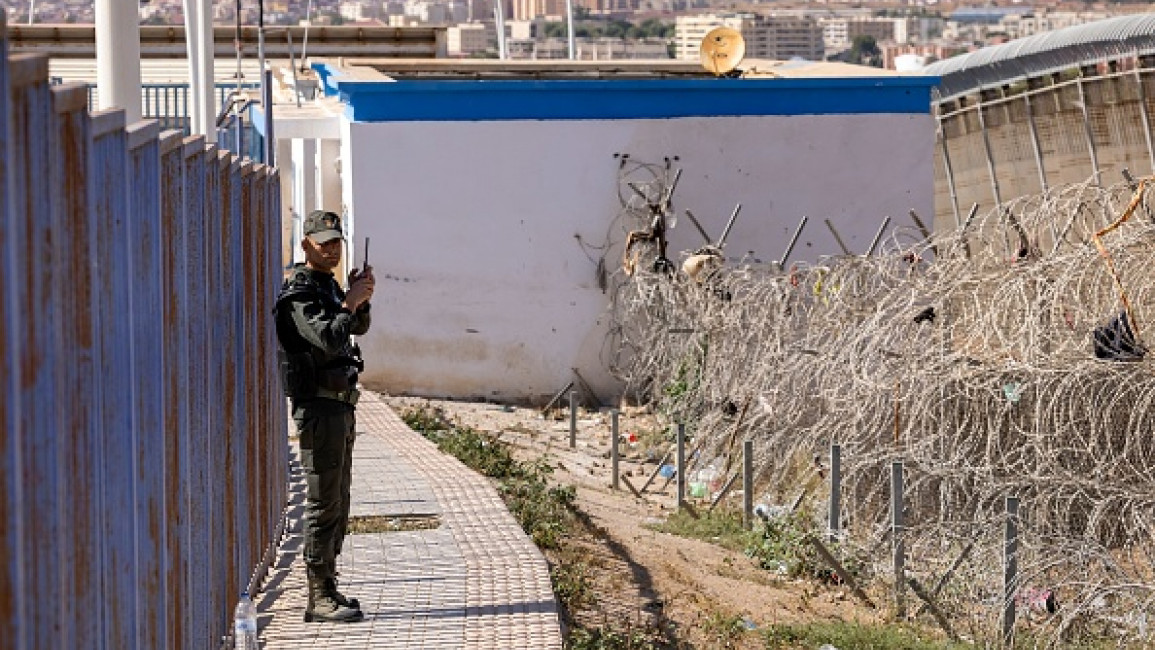Spain and Morocco: A new friendship inked in blood

Basma El Atti
Rabat
11 August, 2022
In-depth: Madrid and Rabat agreed to strengthen cooperation on irregular migration after reconciling in March. The Melilla killings demonstrate how far Morocco is willing to go to maintain this new phase in diplomatic ties.
Seven weeks on from the Melilla massacre, those responsible for killing 23 migrants and injuring dozens more at the Spain-Morocco border have still not been held accountable.
On 24 June, around 2,000 migrants attempted to cross the Barrio Chino fence, one of many border passages separating Morocco’s Nador and the Spanish-controlled enclave of Melilla, one of the European Union's only land borders with Africa.
At least 23 migrants were killed and 77 were injured, according to Moroccan-Spanish official numbers.
“We expect the death toll to be higher than the official number,” Mohammed Amin Abidar, head of the office of the Moroccan Association of Human Rights (AMDH) in Nador, told The New Arab.
"The instrumentalisation of migration is not something new to Spanish-Moroccan diplomatic relations"
Morocco's state-backed Council of Human Rights (CNDH) said the migrants were armed with stones and hooks and injured more than 140 Moroccan officers during the "clashes".
The council also said that the majority of migrants died from 'suffocation'.
Nador has for years been a hub for Sub-Saharan migrants and asylum seekers from war-torn countries seeking a safer refuge away from the dangers and high prices of the maritime migratory routes.
So what has changed?
Madrid and Rabat's new friendship
On 20 July, the Moroccan Association of Human Rights (AMDH), a non-governmental organisation, released a 21-page investigation concluding that the Melilla massacre was a “token of love” from Rabat to its new friend Madrid.
The violence of Moroccan authorities was motivated by a desire to show their Spanish partners "how far they can go to stop migratory flows when the two [Madrid and Rabat] are partners," the investigation said.
In an interview with The New Arab, Mohammed Amin Abidar, head of AMDH-Nador, said that the migrants walked for an hour from the Gourougou forest in Morocco to reach the border fence.
RELATEDBasma El Atti
“No authorities stopped them even though they noticed their movement,” he said.
Videos shared on social media showed groups of migrants walking freely in empty streets in the town of Nador, just hours before the killings.
The instrumentalisation of migration is not something new to Spanish-Moroccan diplomatic relations.
In recent years, the borders of Melilla and Ceuta, the EU's only land borders with Africa, have become diplomatic leverage to resolve conflicts and seal deals.
In 2021, 8,000 migrants surged across the Moroccan-Spanish border in what was widely seen as a punitive move by Rabat against Madrid for hosting Brahim Ghali, the head of the Polisario Front, a Western Saharan separatist group.
At the time, Madrid accused Rabat of blackmail and Rabat responded by recalling its ambassador to Madrid.

A woman holds a placard reading "37 dead in Melilla, 'progressive' government responsible" during a demonstration in Madrid on 26 June. [Getty]
Facing criticism, Morocco's Foreign Minister Nasser Bourita, a diplomat who has gained relative popularity among many Moroccans for his pro-Moroccan Sahara policy, said at the time that Rabat "refuses to play the role of immigration gendarmes to protect the European border”.
The conflict was exacerbated when Saad Eddin El Othmani, Morocco’s PM at the time, addressed the enclaves as “occupied Sebta [Ceuta] and Melilla,” a term that upset Spain.
But after a year of trading barbs, Madrid decided in March 2022 to walk away from its decades-long policy of neutrality on Western Sahara and backed Morocco’s autonomy plan in the disputed territory.
The decision cost Madrid the friendship of Algeria, the Polisario’s loyal sponsor, but gained instead 'strong cooperation' with Rabat, mainly on issues of migration.
"The violence of Moroccan authorities was motivated by a desire to show their Spanish partners how far they can go to stop migratory flows"
AMDH, one of the only Moroccan organisations that have followed the crisis, announced on 30 July that “the death of those young Africans on the European borders is a warning to us about the deadly nature of the Moroccan-Spanish security collaboration on immigration”.
The group’s press statement was also co-signed by 40 Moroccan and Spanish NGOs.
Despite the heavy fatalities in Melilla, comments from the Spanish government reflected Madrid’s enthusiasm for maintaining diplomatic ties after Rabat’s excessive use of force.
Pedro Sanchez, Spain’s prime minister, applauded Morocco’s efforts, stating that the migration crisis was “well handled”.
Facing criticism, the socialist PM took back his statement. However, he continued to stand by the efforts of Moroccan authorities in facing the immigration crisis.
Facing criticism, Morocco's Foreign Minister Nasser Bourita, a diplomat who has gained relative popularity among many Moroccans for his pro-Moroccan Sahara policy, said at the time that Rabat "refuses to play the role of immigration gendarmes to protect the European border”.
The conflict was exacerbated when Saad Eddin El Othmani, Morocco’s PM at the time, addressed the enclaves as “occupied Sebta [Ceuta] and Melilla,” a term that upset Spain.
But after a year of trading barbs, Madrid decided in March 2022 to walk away from its decades-long policy of neutrality on Western Sahara and backed Morocco’s autonomy plan in the disputed territory.
The decision cost Madrid the friendship of Algeria, the Polisario’s loyal sponsor, but gained instead 'strong cooperation' with Rabat, mainly on issues of migration.
"The violence of Moroccan authorities was motivated by a desire to show their Spanish partners how far they can go to stop migratory flows"
AMDH, one of the only Moroccan organisations that have followed the crisis, announced on 30 July that “the death of those young Africans on the European borders is a warning to us about the deadly nature of the Moroccan-Spanish security collaboration on immigration”.
The group’s press statement was also co-signed by 40 Moroccan and Spanish NGOs.
Despite the heavy fatalities in Melilla, comments from the Spanish government reflected Madrid’s enthusiasm for maintaining diplomatic ties after Rabat’s excessive use of force.
Pedro Sanchez, Spain’s prime minister, applauded Morocco’s efforts, stating that the migration crisis was “well handled”.
Facing criticism, the socialist PM took back his statement. However, he continued to stand by the efforts of Moroccan authorities in facing the immigration crisis.
“We must remember that many of these migrants attacked Spain’s borders with axes and hooks,” he told The Associated Press.
Christiane Waked, a Spain-based political analyst and columnist specialising in MENA and Kurdish issues, believes that “Sánchez will do everything to back its position regarding his new politics with Morocco”.
Since siding with Rabat in the Western Sahara dispute, Sanchez has started facing criticism from his own coalition members.
Radical immigration policies and turning down support for the Saharawi people were never on the agenda for socialists in Spain.
However, Waked argues that Sanchez has actually scored several victories since befriending Rabat, despite betraying his party's agenda.
“He recently enjoyed a victory when the Spanish Parliament confirmed the position of his government in favour of the autonomy plan for the settlement of the Sahara conflict, by rejecting with an overwhelming majority a draft resolution hostile to Morocco,” she told The New Arab.

A picture taken on 26 June 2022, shows a member of the Moroccan security forces on the border fence separating Morocco from Spain's North African Melilla enclave, near Nador in Morocco. [Getty]
African allies: Rabat's neglected friends
Strongly identifying with the Saharawi people's struggle, most African countries have recognised the Saharan Arab Democratic Republic (SADR) and have officially sided with the Polisario Front.
After a 33-year-hiatus, in 2017 Morocco decided to increase its engagement with its West African neighbours and other countries across the continent.
This new outreach sought to expand Rabat's regional leadership role and attempt to convince other countries to reconsider their position on Western Sahara.
Through royal visits and investments in struggling African states, the Moroccan monarchy managed to convince most western and southern African countries to shift their position on the disputed territory.
"The Melilla massacre highlighted Morocco's readiness to sacrifice its friendship with its African neighbours to gain the validation of a European state"
That same year, King Mohammed VI launched a second regularisation campaign for African migrants and asylum seekers that was applauded by international NGOs.
Following a similar campaign in 2014, Rabat allowed 25,000 migrants to receive one-year renewable residency permits.
In 2021, thirteen of the nineteen states that opened embassies in Western Sahara as part of their diplomatic recognition of Morocco’s sovereignty over the territory had previously endorsed the Polisario Front.
Apart from South Africa, even those who had not fallen for Rabat’s charm offensive prefered to stay neutral on the dispute so as not to anger the North African Kingdom.
However, the Melilla massacre highlighted Morocco’s readiness to sacrifice its friendship with its African neighbours to gain the validation of a European state.
Political analyst Christiane Waked believes that, so far, Rabat has not been forced to choose between its allies as African leaders did not express much concern over the killing of their citizens in Melilla.
African allies: Rabat's neglected friends
Strongly identifying with the Saharawi people's struggle, most African countries have recognised the Saharan Arab Democratic Republic (SADR) and have officially sided with the Polisario Front.
After a 33-year-hiatus, in 2017 Morocco decided to increase its engagement with its West African neighbours and other countries across the continent.
This new outreach sought to expand Rabat's regional leadership role and attempt to convince other countries to reconsider their position on Western Sahara.
Through royal visits and investments in struggling African states, the Moroccan monarchy managed to convince most western and southern African countries to shift their position on the disputed territory.
"The Melilla massacre highlighted Morocco's readiness to sacrifice its friendship with its African neighbours to gain the validation of a European state"
That same year, King Mohammed VI launched a second regularisation campaign for African migrants and asylum seekers that was applauded by international NGOs.
Following a similar campaign in 2014, Rabat allowed 25,000 migrants to receive one-year renewable residency permits.
In 2021, thirteen of the nineteen states that opened embassies in Western Sahara as part of their diplomatic recognition of Morocco’s sovereignty over the territory had previously endorsed the Polisario Front.
Apart from South Africa, even those who had not fallen for Rabat’s charm offensive prefered to stay neutral on the dispute so as not to anger the North African Kingdom.
However, the Melilla massacre highlighted Morocco’s readiness to sacrifice its friendship with its African neighbours to gain the validation of a European state.
Political analyst Christiane Waked believes that, so far, Rabat has not been forced to choose between its allies as African leaders did not express much concern over the killing of their citizens in Melilla.
RELATEDGiorgio Cafiero
“Many of the migrants came from various African countries, mainly Sudanese and South Sudanese. Though this event might be a cause of important tension between Sudan and Morocco, so far it doesn’t seem to be the case,” Waked told The New Arab.
The day after the massacre, dozens of African diplomats gathered at the headquarters of the ministry of foreign affairs to voice their support for Morocco as it tackled the "human trafficking rings that were behind the events of June 24".
A Hollywood-style story then emerged of a human trafficking boss based in Algeria who ruled over the migratory routes along the road from Nador to Melilla.
The story was promoted by Moroccan media outlets close to the state, as well as Spain's official news agency EFE.
However, AMDH, and independent Spanish media, said the human trafficking story was unfounded and called on African diplomats to stand up for their own compatriots.
"The death of those young Africans on the European borders is a warning to us about the deadly nature of the Moroccan-Spanish security collaboration on immigration"
“If similar events are to be repeated, this will surely create tensions and will push citizens and families of victims to demand that their countries hold accountable those responsible on both sides of the borders,” said Waked in a statement to The New Arab.
Mohammed Amin Abidar, the head of AMDH - Nador, said dozens of families have reached out to the association as the Moroccan state refuses to communicate any information about the massacre.
“When we contact the hospital to check the health situation of certain migrants they say they cannot share any information since everything about the day is classified by the interior ministry,” Abidar told The New Arab.
Until this day, Rabat continues to hide behind a wall of silence to avoid accountability, even as many migrants still remain missing since the massacre.
Basma El Atti is The New Arab's Morocco correspondent.
Follow her on Twitter: @elattibasma
No comments:
Post a Comment